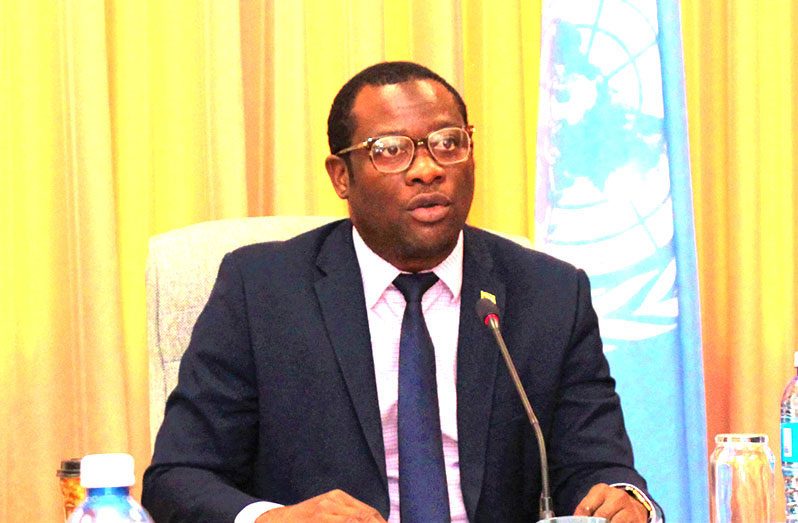–Guyana rejects latest claim to its land by Venezuelan Government, Opposition
VENEZUELA’S latest move to lay claim to Guyana’s territory through an internal agreement between the nation’s government and its opposition was rejected categorically by the Government of Guyana.
At a meeting in Mexico City on September 6, 2021, the Heads of Delegation of the Venezuelan Government and the opposition’s Unity Platform of Venezuela agreed to ratify Venezuela’s purported rights over the Essequibo, Guyana’s territory, and signed an agreement to that effect.
This agreement was, however, rejected by the Government of Guyana, which, through the Foreign Affairs and International Cooperation Ministry, stated: “That agreement is an overt threat to the sovereignty and territorial integrity of Guyana. Guyana cannot be used as an altar of sacrifice for settlement of Venezuela’s internal political differences.
“While the Government of Guyana welcomes domestic accord within Venezuela, an agreement defying international law and process is not a basis for mediating harmony.”
Guyana’s position, as stated before, is that the controversy with Venezuela is properly before the International Court of Justice (ICJ) and will remain there for peaceful resolution.
In March 2018, Guyana filed its application in the International Court of Justice (ICJ) seeking an affirmation of the validity of the 1899 Arbitral Award and the international boundary that it established. The ICJ ruled on December 18, 2020, that it has jurisdiction to hear the border controversy case.
Guyana is seeking to obtain a final and binding judgement that the 1899 Arbitral Award, which established the location of the land boundary between then British Guiana and Venezuela, remains valid, and that the Essequibo region belongs to Guyana and not Venezuela.
A report from Energy Company, S&P Global Platts, however, related that Venezuela, in its agreement, rejects the ICJ’s declaration of jurisdiction over the issue, and urged Guyana to engage in direct negotiations.
“We will call on Guyana to resume the path of negotiations in order to reach an agreement on the territory,” representative of Venezuelan President Nicolas Maduro, Jorge Rodríguez, was reported as saying.
Venezuela has said, for the longest while, that it is not interested in having this matter resolved by the court. And from all indications, Venezuela early this year seemed bent on arbitrarily laying claim to Guyana’s territory, with its naval forces intruding on Guyana’s maritime space.
Increased activity by Venezuela’s naval vessels and other forces in Guyana’s Exclusive Economic Zone (EEZ) started after Venezuela’s President Nicolás Maduro issued a decree claiming Venezuela’s sovereignty and exclusive sovereign rights over the waters and seabed adjacent to Guyana’s coast, west of the Essequibo River.
Despite outright condemnation of Venezuela’s latest claims and global recognition of Guyana’s sovereign rights over the contested area, a naval vessel attached to the Bolivarian Republic, just days after the issuance of the decree, entered Guyana’s territory and abducted 12 fishermen, who have since been released.
A peaceful conclusion to its border controversy with Venezuela remains Guyana’s aim, but Commander-in-Chief of the armed forces and President of Guyana, Dr. Irfaan Ali, had affirmed that his nation will not cower in the face of threats against national security.
“As President of our beloved country, my single most important responsibility is to keep the Guyanese people safe. It is the first thing I think about when I wake [up] in the morning. It is the last thing on my mind at night. And my working day is consumed by it.
“But I want no mistake made about it: my government is doing all in its power to vigorously protect our people’s health and our country’s territorial integrity. Just as we will not relent in the battle against COVID-19, so will we not bend to threats to our national security…we may be a small country, but we are a proud people. We have no military might, but we have moral and legal right. We pick fights with no one, but we will resist threats from anyone,” President Ali said early this year.
The most recent international stakeholder to add its voice to this matter has been the United Nations (UN) through Secretary-General, Antonio Guterres.
According to President Ali, Guterres, in a letter, made reference to January 30, 2018, when he chose the ICJ as the means to be used for solution of the controversy.
The secretary-general acknowledged that the court is proceeding to adjudicate the merits of the case.
“Guyana is fully committed to the ICJ process. We believe international law and independent international jurists of the highest calibre offer the most credible and definitive way in which to put an end to the Venezuelan contention. Therefore, we will continue to pursue that course,” President Ali said.




.png)









